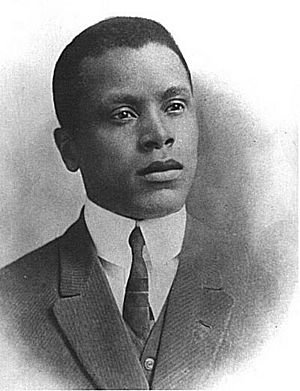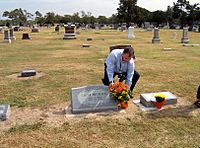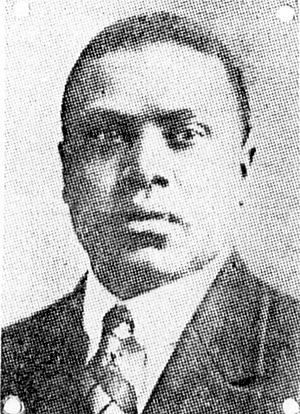Oscar Micheaux facts for kids
Quick facts for kids
Oscar Micheaux
|
|
|---|---|

Micheaux c. 1913
|
|
| Born |
Oscar Devereaux Micheaux
January 2, 1884 Metropolis, Illinois, U.S.
|
| Died | March 25, 1951 (aged 67) |
| Occupation | Director, author |
| Spouse(s) |
|
| Awards |
|
Oscar Devereaux Micheaux (January 2, 1884 – March 25, 1951) was an important author, film director, and independent producer. He made more than 44 films. While the Lincoln Motion Picture Company was the first movie company owned by black filmmakers, Micheaux is known as the first major African-American filmmaker to create feature films. He was a leading producer of "race films," which were movies made for and about black audiences. Many people call him "the most successful African-American filmmaker of the early 20th century." He made both silent films and movies with sound.
Contents
Early Life and Learning
Micheaux was born on a farm in Metropolis, Illinois, on January 2, 1884. He was the fifth of 13 children born to Calvin S. and Belle Michaux. Later in his life, Micheaux added an "e" to his last name. His father was born into slavery in Kentucky.
When he was young, Micheaux faced unfair treatment. His parents moved to the city so their children could get a better education. Micheaux went to a good school for several years. But his family had money problems and had to move back to the farm. Micheaux became unhappy and had trouble with his family. His father sent him to the city to sell things. Micheaux liked this job because he met many new people. He learned social skills that he later used in his films.
When Micheaux was 17, he moved to Chicago to live with his older brother. Micheaux didn't like his brother's way of life. He got his own place and worked in the stockyards, which was hard work. He then worked in steel mills, doing many different jobs.
Micheaux decided to start his own business. He opened a shoeshine stand in a wealthy African American barbershop. He learned basic business skills and saved money. He then became a Pullman porter on trains. This was a respected job for African Americans at the time. It paid well and allowed him to travel and meet new people. This job taught Micheaux a lot. He saved money and made connections with wealthy white people who helped him later. When he left the job, he had seen much of the United States. He had saved thousands of dollars and made many useful contacts.
Micheaux moved to Gregory County, South Dakota. He bought land and worked as a homesteader. This means he settled on land given by the government to farm it. This experience gave him ideas for his first novels and films. His neighbors were mostly white working-class people. Micheaux's time as a homesteader helped him learn about people and farming. While farming, he wrote articles for newspapers. The Chicago Defender published one of his first articles. His farm did not succeed, and he had to sell it in 1911. The next year, he started his publishing career. He wrote a book called The Conquest. He then started a second book, The Forged Note. From 1914 to 1918, he traveled to sell his books.
Writing and Film Career
Micheaux decided to focus on writing and, later, filmmaking. Filmmaking was a new industry then. He wrote seven novels in total.
In 1913, 1,000 copies of his first book, The Conquest: The Story of a Negro Pioneer, were printed. He published it without his name, for reasons we don't know. The book was based on his life as a homesteader and his first marriage. It was mostly about himself, even though the character names were changed. The main character was named Oscar Devereaux. The book's main idea was about African Americans reaching their full potential. It showed them succeeding in areas where they thought they couldn't. The book talked about the difference between city life for black people and the life he chose as a pioneer in the West. He wrote about people who want to achieve things and those who feel like victims. He wanted more black people to move West and build a life for themselves. He believed that hard work and starting businesses would bring respect and success to anyone, no matter their race.
In 1918, his novel The Homesteader caught the eye of George Johnson. Johnson was the manager of the Lincoln Motion Picture Company in Los Angeles. Johnson offered to turn The Homesteader into a movie. But they couldn't agree on the details. Micheaux wanted to be directly involved in making the movie, but Johnson didn't agree. So, the film was never made by Johnson.
Instead, Micheaux started his own company, the Micheaux Film & Book Company. Its first project was to make The Homesteader into a movie. Micheaux became a very successful film producer and director. He made over 40 films that were shown across the U.S. and in other countries. Micheaux reached out to wealthy people he had met as a porter. He sold shares in his company for $75 to $100 each. Micheaux hired actors and actresses and decided to show the movie first in Chicago. The film and Micheaux received high praise from critics. One article called it "a historic breakthrough, a creditable, dignified achievement." Some church leaders in Chicago criticized the film. The Homesteader became Micheaux's first big hit. It made him well-known as a writer and filmmaker.
Micheaux not only wrote and directed his own films, but he also used stories from other writers for his silent movies. Many of his films were honest and made people think about racial issues of that time. He once said that by showing black people as they truly were, he could help them reach "greater heights." During the Great Depression, it became hard for Micheaux to make films. He then went back to writing books.
His Films
Micheaux's first novel, The Conquest, was made into a film called The Homesteader. This film was released in 1919 and was very popular. It tells the story of a man named Jean Baptiste, who is called the Homesteader. He falls in love with white women but chooses not to marry them to stay loyal to his race. Baptiste gives up love to be a symbol for other African Americans. This film explores relationships between different races.
Micheaux's second silent film was Within Our Gates, made in 1920. Some people think it was his answer to the film The Birth of a Nation. But Micheaux said he made it on his own. He wanted to show the social problems after World War I.
In Within Our Gates, Micheaux shows educated black people as light-skinned. This represented the higher status of some mixed-race people who were free before the Civil War. Poor people are shown as dark-skinned. Mixed-race people are also shown as some of the bad characters. The film takes place during the Jim Crow era, a time of racial segregation. It compared the lives of African Americans who stayed in the countryside with those who moved to cities. Micheaux showed the struggles of African Americans in his time. Some people worried the film would cause more trouble in society. Others believed it would help people see the unfair treatment of black people by whites.
Micheaux also made films based on books by Charles W. Chesnutt. These were The Conjure Woman (1926) and The House Behind the Cedars (1927). The House Behind the Cedars was about people of mixed race and "passing" as white. It caused so much debate that Micheaux had to cut parts of it to get it shown. He remade this story as a sound film in 1932, called Veiled Aristocrats. The silent version of the film is now lost.
Main Ideas in His Films
Micheaux made his films during a time of big changes for African Americans. His movies showed what black life was like then. He explored relationships between black and white people. He also showed the challenges black people faced when trying to succeed in society. His films were used to speak out against racial unfairness. Topics like unfair jobs and money problems were shown in his films. These movies also reflected his own ideas and experiences.
Micheaux wanted to make films that would fight against the bad ways white filmmakers showed African Americans. He created detailed characters from different social classes. His films questioned the values of both African-American and white societies. This sometimes caused arguments with newspapers and government censors.
His Style
Film critic Barbara Lupack said Micheaux tried to be balanced in his films. She called his work "middle-class cinema." His movies were made to appeal to both middle-class and working-class audiences.
Death

Micheaux died on March 25, 1951, in Charlotte, North Carolina. He is buried in Great Bend Cemetery in Great Bend, Kansas. His gravestone says: "A man ahead of his time."
Personal Life
In South Dakota, Micheaux married Orlean McCracken. Their marriage was difficult. Orlean felt Micheaux didn't pay enough attention to her. She gave birth while he was away. She then reportedly took all their money from the bank and left. Orlean's father sold Micheaux's property and kept the money. Micheaux tried to get his wife and property back but failed. He married Alice Russell in 1926. Oscar and Alice stayed married until he died.
Legacy and Honors
- The Oscar Micheaux Society at Duke University honors his work and teaches people about him.
- In 1987, Micheaux received a star on the Hollywood Walk of Fame.
- In 1989, the Directors Guild of America gave Micheaux a Golden Jubilee Special Award.
- The Producers Guild of America created an award named after him.
- In 1989, the Black Filmmakers Hall of Fame gave him an award after his death.
- Gregory, South Dakota holds an annual Oscar Micheaux Film Festival.
- In 2001, the Oscar Micheaux Golden Anniversary Festival was held in Great Bend, Kansas.
- In 2002, scholar Molefi Kete Asante included Oscar Micheaux on his list of 100 Greatest African Americans.
- On June 22, 2010, the US Postal Service released a stamp honoring Oscar Micheaux.
- In 2011, the Taubman Museum of Art in Roanoke, Virginia created a special group for donors, the Micheaux Society, named after him.
- Midnight Ramble: Oscar Micheaux and the Story of Race Movies (1994) is a documentary about him. Its title refers to how some movie theaters in the past would show films for African-American audiences late at night.
- In 2019, Micheaux's film Body and Soul was chosen by the Library of Congress. It was saved in the National Film Registry because it was important for culture, history, or art.
- The Oscar Micheaux Award for excellence was created.
- The Academy Museum of Motion Pictures has an exhibit about his work.
The Czar of Black Hollywood
In 2014, Block Starz Music Television released The Czar of Black Hollywood. This documentary film tells the story of Oscar Micheaux's early life and career. It uses old footage, photos, and music from the Library of Congress. The film was announced by radio host Tom Joyner. Filmmaker Bayer Mack said he was inspired to make the film after reading a book about Micheaux. Mack was surprised that there was "virtually nothing out there about [his] life." The film's executive producer, Frances Presley Rice, said Micheaux was the first "indie movie producer." In 2018, Mack said Micheaux showed "the best of what we all are as Americans" and was "an inspiration."
A historical marker in Roanoke, Virginia, remembers his time living and working there as a film producer.
Works
Filmography
- The Homesteader (1919) [lost]
- Within Our Gates (1920)
- The Brute (1920) [lost]
- The Symbol of the Unconquered (1920)
- The Gunsaulus Mystery (1921) [lost]
- The Dungeon (1922) [lost]
- The Hypocrite (1922) [lost]
- Uncle Jasper's Will (1922) [lost]
- The Virgin of the Seminole (1922) [lost]
- Deceit (1923) [unknown]
- Birthright (1924) [lost]
- A Son of Satan (1924) [lost]
- Body and Soul (1925)
- Marcus Garland (1925) [lost]
- The Conjure Woman (1926), adapted from novel by Charles W. Chesnutt [lost]
- The Devil's Disciple (1926) [unknown]
- The Spider's Web (1926)
- The Millionaire (1927)
- The Broken Violin (1928)
- The House Behind the Cedars (1927), adapted from novel by Charles W. Chesnutt [lost]
- Thirty Years Later (1928) [lost]
- When Men Betray (1929) [lost]
- The Wages of Sin (1929) [lost]
- Easy Street (1930) [lost]
- A Daughter of the Congo (1930) [lost]
- Darktown Revue (1931)
- The Exile (1931)
- Veiled Aristocrats (1932) [fragments lost]
- Ten Minutes to Live (1932)
- Black Magic (1932)
- The Girl from Chicago (1932)
- Ten Minutes to Kill (1933)
- Phantom of Kenwood (1933)
- Harlem After Midnight (1934) [lost]
- Murder in Harlem (1935)
- Temptation (1936)
- Underworld (1937)
- God's Step Children (1938)
- Swing! (1938)
- Lying Lips (1939)
- Birthright (1939) [lost]
- The Notorious Elinor Lee (1940)
- The Betrayal (1948) [lost]
See also
 In Spanish: Oscar Micheaux para niños
In Spanish: Oscar Micheaux para niños
- Deanna Michaux
 | William M. Jackson |
 | Juan E. Gilbert |
 | Neil deGrasse Tyson |


